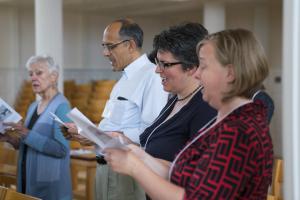Everything Old Is New Again: the Transformative Power of the Psalter
 Paul E. Olive-Reese, MDiv ‘19
Paul E. Olive-Reese, MDiv ‘19
My family’s bible, long cherished by my grandparents, contains many ancient stories: biblical narratives of the patriarchs, the prophets, Jesus, and his disciples. This physical book also bears many family stories: memories of Christmas carols around an out-of-tune piano, family reunions and marriages, sicknesses and funerals. The Pentateuch and the gospels are well thumbed, the Pauline epistles show some wear, and even the prophets have a touch of browning along the edges. But about halfway through the mostly crumbling book there sits a mostly unthumbed segment, yellowed only by time: the Psalter. Aside from the Psalm 23, the words and rhythms of the psalms were mostly unuttered in my family’s context, in spite of our strong, evangelical love of scripture.
As I sat among lay leaders, church musicians, clergy, and scholars at the ISM Congregations Project, it became evident that my experience was not uncommon. However, the conference did much to remedy this gap. As we worshiped and learned together for three days at the juncture of biblical tradition and personal experience, conference participants interacted again and again with the psalms. We sang them in corporate worship, heard them opened up in lectures, and wrestled with them in discussion, seeking answers to the difficult questions raised by our time together. How does a community continue to function in an environment where the threat of violence looms constantly? What language can help a community to process its grief? Where is the voice of God amidst the never-ending spate of violent acts that continue to plague our world?
Crucial to the conference was a deceptively simple premise: The psalms are a means for connection and reflection, even in the face of violence. The language of the psalms forces readers to recognize that the honest and vulnerable—even virulent and yet still valid—emotions expressed by the authors of the psalms till exist within us today. But these emotions are often denied and suppressed. In this context, liturgical theologian Don Saliers remarked, psalms provide a way tell the truth about and to ourselves.
When this happens, the psalms can connect us back to our inner selves. Such honesty with the self opens us up to an honest experience of others and the world around us. Indeed, in the collective singing and speaking of the psalms, leaders from several Christian traditions quickly found common ground. As we proceeded through the rhythm of the psalms–sometimes spoken, sometimes sung–and saw them interpreted in the media of dance or visual art, we pondered together the Holy Spirit’s work in the process of healing from violence. Sharing the psalms created moments of cultural memory that contributed to our experience as a group of faith-based leaders whose paths were crossing, even though briefly.
Conference sessions explored how the psalms reconnect us with our faith traditions not only through song and prayer, but also through the lens of biblical exegesis. Dr. John J. Collins, Professor of Old Testament Criticism and Interpretation, challenged us to recognize and wrestle with depictions of violence in the biblical texts rather than dismiss them. The difficult work of appropriating scripture, Collins argued, is lacking substantially without exegesis and catechesis.
Finally, the psalms become a means to reconnect with God. We were reminded by many voices that the texts of some psalms are not easily read, wrestled, or incorporated into corporate worship—but coming to terms with the truths they name is not meant to be easy. Encountering the infamous final verse of Psalm 137 or the plaintive verses of Psalm 13 challenges our communities to confront our own complicity in systems of violence. In considering the psalmist’s relationship with God, we are challenged to question our own notions of who God is and how we are to communicate with Her.
These old words have the power to breathe new life into a stagnant life of prayer. They certainly do this for me. Now, when I open my prayer book as my grandparents did the family bible, I lift the ribbon which marks the psalter and recognize the power of the words which sit before me with fresh eyes. In speaking aloud the words and hearing their sounds decay into silence, I feel connected to believers of the past and present who have celebrate(d) weddings, funerals, and remembrances of their own. The next time you open your holy book, I hope you find yourself flipping to the unthumbed section and lingering there awhile.